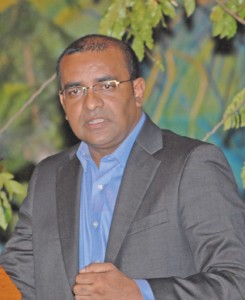“If not materialized, it could be a lost opportunity for Guyana”
By Samuel Sukhnandan

Former President Bharrat Jagdeo said the Amaila Falls project is a lost opportunity that Guyana could regret, if it does not materialise. Jagdeo expressed the sentiment while noting the economic benefits that would have been derived out of that major investment.
He was at the time addressing a forum at the International Conference Centre where stakeholders from the private sector gathered to discuss critical economic issues.
Guarantee
Jagdeo debunked claims that the project is not feasible, stating that the contingent liability for the project was just a guarantee, just in case the Guyana Power and Light (GPL) could not make their payments. The move not to approve this, he said, killed the project.
“We can’t keep shooting ourselves in the foot, this project should have been above politics, because we tried a long time from the fifty’s and the sixty’s since Tiger Falls and Burnham promised the hydro in 1978,” he explained.
When the project was promised in 1978, the decision was split on whether to approve a minimum wage of Gy$ 14 or to develop the hydro project. Neither came through, but Guyana spent then US$ 300 million and had to pay it back.
The value of that money would have been over $ 2 billion in today’s Guyana dollars.
The former Guyanese leader said Guyana paid back the loan without getting a single kilowatt of power, but noted that Amaila was the closest to realising the hydro dream.
No debt
“There is not a single cent of debt outside of that money we are spending on the road and the equity that we are taking that will be accrued to this country and yet we heard that it is the debt that we are worried about, higher debt and that is why we didn’t approve the project.”
Jagdeo stressed that this project would have been ideal for taking Guyana into the 21st century, as it tries to meet the challenges of the global economy and the rapid economic changes that are taking place.
The world, he said is changing rapidly and many times policy makers, not particularly those from the executive, but the three branches of government are “happy in oblivion” to what is going on in the rest of the world.
He pointed to the move by the U.S. government to develop a policy which is aimed at having the Federal Reserve stop purchasing or intervening in the global market in the near future.
He noted that the Federal Reserve currently buys $ 85 billion in government papers and this is likely to affect huge economies such as Brazil, India and Russia.
He stated that money for investment will not always be available and government has recognised the need for foreign capital to create growth, income and employment, hence, the reason for foreign investment.
“What pains me is over the past weeks, we have made through ignorance and partisanship a decision that has impacted on the largest private investment in the country – hydro power,” he said.
Change
On that note, Jagdeo said there is a need for a change in the nature of politics in Guyana and said economic development will never take place in the hostile political environment that exists now.
The US$ 840 million hydro project involves the construction of a hydropower plant in the area of westcentral Guyana, where the Amaila and Kuribrong rivers meet. Electricity produced at the plant would have been delivered to Georgetown, and Linden, by transmission lines.
The project, once completed, will result in significant foreign exchange savings and a regular supply of inexpensive, reliable electricity for Guyanese.
The project is a fundamental component of Guyana’s Low Carbon Development Strategy, and will significantly lower the nation’s carbon footprint while reducing its long-term energy costs and exposure to imported oil price volatility.



